|
|
|
Sort Order |
|
|
|
Items / Page
|
|
|
|
|
|
|
| Srl | Item |
| 1 |
ID:
183587
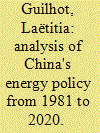

|
|
|
|
|
| Summary/Abstract |
Looking back at four decades of China's energy policy (1981–2020), three momentous shifts can be said to have taken place. From the Sixth Five-Year Plan (1981) to the Ninth Five-Year Plan (2000), the focus was exclusively on improving energy efficiency. Subsequently, from the Tenth Five-Year Plan (2001) to the Eleventh Five-Year Plan (2010), energy security also became a major objective, as awareness of the gradual depletion of fossil fuels grew. From 2011 onwards (Twelfth and Thirteenth Five-Year Plans), China's energy policy has also aimed to ward off climate change. This policy evolution suggests that the Chinese economy has initiated a low-carbon energy transition since 2011. Nevertheless, this transition cannot be considered sustainable because the local government are reluctant to apply stringent institutional limitations to wealth-creating processes within their jurisdiction and because China's energy consumption is not decoupled from its economic growth and total environmental costs of renewable energy are not taken account. In seeking to usher in a sustainable energy system, the Chinese government needs to overcome three challenges: 1/an institutional challenge; 2/an economic challenge and 3/an environmental challenge.
|
|
|
|
|
|
|
|
|
|
|
|
|
|
|
|
| 2 |
ID:
183562
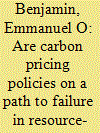

|
|
|
|
|
| Summary/Abstract |
There are limited studies on specific factors that affect willingness-to-pay (WTP) and public concerns on spending of pollution pricing in democratic economies that are carbon dependent. In light of the discourse on global pollution pricing, this study explores the complex influence of political-economic, attitudinal, and socio-demographic factors on carbon pricing, by estimating the WTP in a carbon resource-dependent economy such as Canada and the preferred revenue earmarking of Canadians. An online survey of 600 Canadian households was conducted using the random device engagement (RDE) approach. This study uses a contingent valuation method (CVM) and payment card (P.C.) to estimate the household WTP for carbon pricing on direct energy expenditure and an ordered logistic regression model for odds ratio estimates. The estimated annual WTP ranges between CAD$ 84 to CAD$ 230 in 2019 (CAD$ 1 = US$ 0.7538). This implies an acceptable increment of 1.5%–2.5% (CAD$ 157 to CAD$ 259) to the average yearly household energy expenditures. This study suggests that Canadians appear to be supportive of redistributing carbon price revenues and investing in clean energy technology. Canadian government needs to address public concerns surrounding political-economic factors, specifically the energy cost implication for vulnerable households in order to achieve emission reduction targets.
|
|
|
|
|
|
|
|
|
|
|
|
|
|
|
|
| 3 |
ID:
183577
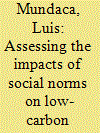

|
|
|
|
|
| Summary/Abstract |
Policymakers and scientists are paying increasing attention to how social norms can promote pro-environmental behaviour and sustainable energy use. We contribute to this field by experimenting with and assessing the impacts of social norms on low-carbon mobility options. Taking Sweden as a case study, we develop two complementary randomised controlled experiments to: 1) analyse the role of social norms in promoting the adoption of car sharing services (CSS) via descriptive and injunctive norms (N = 720); and 2) investigate potential crowd out effects when injunctive norms are used to promote a low-carbon transport hierarchy (N = 730). First-order effects show that social norms have a positive but marginal impact on the willingness to adopt CSS, and only injunctive norms have the potential to steer behaviour in the desired direction. Results also suggest that concerns about potential substitution effects between low-carbon transport options and CSS are not valid. With due limitations, our findings have various implications for policymaking, notably that for social norms to be effective, other policy instruments are critically needed. Of particular importance are the environmental effectiveness of CSS and complementarities between public transport and active mobility (i.e. walking and cycling).
|
|
|
|
|
|
|
|
|
|
|
|
|
|
|
|
| 4 |
ID:
183559


|
|
|
|
|
| Summary/Abstract |
The implementation of renewable portfolio standard (RPS) policy may bring some adverse effects when the region lacks of the capacity to cope with policy stresses. This paper proposes an analytical framework of adaptive capacity index to RPS policy (ACI-RPS) and apply it to evaluate the provincial adaptive capacity to RPS in China over time. The results show that the ACI-RPS in China displayed an increasing trend but declined slightly in 2017 due to the technical bottlenecks. There was a wide disparity in ACI-RPS across the provinces in China, with eastern provinces having the highest but northeastern provinces having the lowest scores. These results indicate that provincial RPS targets need to be set with reference to their adaptive capacity and local energy status. Specifically, more ambitious targets may be assigned to eastern, southern, and northern provinces. It is concluded that the promotion of power grid construction and the acceleration of power marketization are two effective ways to further improve the capacity to cope with RPS policy of a region.
|
|
|
|
|
|
|
|
|
|
|
|
|
|
|
|
| 5 |
ID:
183578


|
|
|
|
|
| Summary/Abstract |
This paper investigates the design of a recent regulatory proposal aimed at favoring the emergence of a battery recycling industry in Europe. Electric mobility is deemed necessary to cut CO2 emissions in the transport sector but the industrial and environmental impacts of lithium-ion battery manufacturing are controversial. A recent regulatory proposal from the European Commission introduces the obligation to attain a series of minimum thresholds of recycled materials for the new batteries to be manufactured after 2030. This paper discusses the conditions required for that obligation to be fulfilled. It develops a material flow model that projects battery wastes and their recycling potential. Our findings indicate that the feasibility of proposed thresholds is not very sensitive to changes of material intensities from battery technology shifts, recycling efficiencies, or the faster uptake of demand. On the contrary, battery lifetimes are the most crucial parameters for recycling potential. We believe that this result could jeopardize avenues for extending battery lifetimes such as second-life battery usage. Our policy recommendations are twofold. First, we recommend lower thresholds to improve the regulation credibility. Second, the regulation should integrate other objectives that address the lifetime of batteries.
|
|
|
|
|
|
|
|
|
|
|
|
|
|
|
|
| 6 |
ID:
183565


|
|
|
|
|
| Summary/Abstract |
Curbing climate change is gaining increasing consensus globally. While many countries seek to set carbon prices, significant price dispersion and policy stringency continue to raise concerns about competitiveness. To address this issue, the EU has proposed a carbon border adjustment mechanism (CBAM), which aims to level the playing field by levying a carbon price on EU imports. In this paper, we estimate the competitiveness and welfare impacts of the EU CBAM, based on a refined multi-regional IO approach. We quantify changes in the value of exports to the EU market upon CBAM implementation for both EU members and non-EU economies. It is found that the EU CBAM will lead to a redistribution of competitiveness among countries and regions. Specifically, it is estimated that EU output would increase by 0.38 per cent while output in rest of the world decreases by 0.1 per cent in the short run, when CBAM is set at $US100/tCO2e. The burden is unevenly distributed among regions, with China, Russia and India bearing the most. Moreover, a deeper sub-national-level analysis on China shows that, given its pervasive domestic production network, income losses in landlocked provinces exceed their export losses, contrasting with the pattern for trade-exposed provinces.
|
|
|
|
|
|
|
|
|
|
|
|
|
|
|
|
| 7 |
ID:
183589
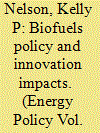

|
|
|
|
|
| Summary/Abstract |
In the early 2000s, governments implemented policies stimulating the use of ethanol and biodiesel to reduce carbon emissions and encourage domestic energy production. Blend mandates requiring gasoline or diesel to contain a minimum percentage of these biofuels were a favored policy instrument. Theoretical work by Clancy and Moschini (2017) concluded that, if innovation were stimulated by mandates, then the socially optimal mandate would be higher than if innovation were not possible. We test the impact of blend mandates and other biofuels policies on innovation using measures of patenting activity that correspond with research effort and research output. Our analysis shows that ethanol blend mandates significantly increased both R&D effort and quality-weighted innovation output in biofuels technologies while reducing the R&D inputs to plant technologies. This suggests that biofuels innovation increased in response to the policies, with firms substituting some R&D effort away from plant technologies research. Despite decreased R&D effort, output of plant innovation held steady as effort shifted to biofuels, supporting the presence of a spillover effect between biofuels innovation and plant innovation. We find that biodiesel blend mandates did not significantly impact R&D efforts in either plant or biofuels technologies. Furthermore, policies other than blend mandates had varying effects, ranging from limited increases in R&D activity to significant decreases in innovation.
|
|
|
|
|
|
|
|
|
|
|
|
|
|
|
|
| 8 |
ID:
183563


|
|
|
|
|
| Summary/Abstract |
Financial incentives, such as rebate programs, are widely used to promote the adoption of residential solar photovoltaic systems. This paper studies the changing effectiveness of rebate programs as the solar market evolves. We develop a theoretical model to first characterize individual treatment effects then aggregate them to regional effect, and hypothesize that the aggregate treatment effect of rebates first increases and then decreases with declining costs and increasing net metering rate. We empirically test our hypotheses by estimating the treatment effect of rebate rate in California from 2006 to 2017 and its interaction terms with installation cost and residential electricity rate. Results confirm our hypotheses and identify an installation cost of $8.84/W and a residential electricity rate of 22.36c/kWh as the turning points where rebate impacts start to decline. Our findings suggest that front-loaded rebate rate design can be an effective and efficient tool at promoting residential solar adoption.
|
|
|
|
|
|
|
|
|
|
|
|
|
|
|
|
| 9 |
ID:
183588


|
|
|
|
|
| Summary/Abstract |
China is the largest emitter worldwide, and coal consumption contributes the most. So the key to emission mitigation is to reduce coal consumption. The paper applies panel data during 1998–2017 to analyze the relationship between coal consumption and economic development. The results indicate that the relationship is now weakening, and find evidence of inter-provincial relocation of the coal-intensive industries. The reduction of the marginal contribution provides the possibility for China's economic emission mitigation. Then, the paper applies a dynamic recursive computable general equilibrium model to simulate carbon mitigation policies during 2017–2030 at the same emission reduction level, including coal capacity cut, Emission Trading Scheme (ETS), carbon tax with ETS, and resource tax. The results show that different policies have specific advantages: coal capacity cut reduces coal consumption the most; ETS significantly improves the share of renewable energy; carbon tax with ETS could optimize economic structure; resource tax is good at protecting the economic aggregate. Based on these conclusions, specific policy implications are proposed, such as measurements of increasing energy cost and collaborative regional environmental regulation.
|
|
|
|
|
|
|
|
|
|
|
|
|
|
|
|
| 10 |
ID:
183586
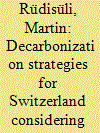

|
|
|
|
|
| Summary/Abstract |
Decarbonizing the energy system by electrification of heat and transport is only effective when using low-carbon electricity sources. As many countries such as Switzerland rely on imported electricity to meet their demand, the greenhouse gas (GHG) content of electricity imports must be correctly accounted for. By assuming an average GHG content for each amount imported, impacts of electricity required in peak periods are underestimated because additional (marginal) demand is primarily met with fossil power plants. This study employs a model to capture marginal GHG contents of imported electricity from a direct and indirect (life-cycle) perspective at an hourly resolution. Implications on GHG are explored for various electricity demand and supply scenarios including electrification of heat and transport, large-scale expansion of renewables, and nuclear phase-out. We find that depending on the scenario, the average GHG intensity of consumed electricity may double, while diurnal and seasonal variations are even larger. Nonetheless, results show substantial GHG mitigation of up to 45% with electrification in case of deploying a diversified electricity generation portfolio including photovoltaics and wind. For optimal GHG mitigation, short-term flexibility as provided by hydropower is necessary to manage electricity surpluses. The main challenge, however, surrounds seasonal energy storage including sector coupling.
|
|
|
|
|
|
|
|
|
|
|
|
|
|
|
|
| 11 |
ID:
183582


|
|
|
|
|
| Summary/Abstract |
With firm-level panel data for seven years, this study evaluated the effect of carbon pricing policy and analyzed how firms respond to the carbon price, focusing on Korea's Emission Trading Scheme (ETS). Under the assumption that firms' responses to the carbon price might differ across industries, this study compared the manufacturing and electricity generation sectors. Our panel regression analyses show that the ETS has significant impacts on firms' carbon reduction. However, the carbon reduction mechanisms of firms differ by industrial sector. Firms in the manufacturing sector reduced carbon emissions by improving the energy efficiency of their facilities. On the other hand, those in the electricity generation sector reduced emissions by phasing out the use of fossil fuels and by giving more weight to low carbon-intensive energy sources. These findings imply that carbon pricing works as designed, sending economic signals for firms to decarbonize their economic activities. Furthermore, it works differently (and so effectively) according to the industry's characteristics.
|
|
|
|
|
|
|
|
|
|
|
|
|
|
|
|
| 12 |
ID:
183560


|
|
|
|
|
| Summary/Abstract |
The increasing diffusion of electric vehicles (EVs) can challenge the stability of distribution grids. Smart charging systems can reduce the stress of EV charging on the grid, but the potential of the technology depends on EV drivers' participation in smart charging schemes. To investigate this potential, we conducted an online randomised-controlled experiment with two waves (baseline and experimental phase, N = 222), in which we examined drivers' preferences for smart charging and tested a behavioral intervention to increase the number of smart charging choices. We translated state-of-charge (SoC) information from percentage of battery level into miles corresponding to the battery level and tailored information, i.e., the number of driving days covered by the actual SoC based on participants’ personal driving profiles. Participants preferred to use smart charging systems to decrease costs and to increase renewable energy use. However, they tended to overestimate the importance of the battery SoC when setting charging preferences. This overestimation was especially evident for participants who only drive short distances and may be lead to inefficient use of smart charging technology. Translating battery SoC into tailored information corrected for this bias and increased the number of smart charging choices. Our findings illustrate how behavioral interventions can be leveraged to attain energy transition goals.
|
|
|
|
|
|
|
|
|
|
|
|
|
|
|
|
| 13 |
ID:
183583


|
|
|
|
|
| Summary/Abstract |
Economic development accelerates the process of industrialization that has amplified the worth of extracted natural resources. Extensive exploitation of natural resources through total reserves, financial development, and renewable energy can influence the atmosphere. In view of this, this study examines the influence of industrialization, total reserves and the expansion of financial, renewable and natural resources on the ecological footprint. This research applies panel data for the period from 1990 to 2019 in newly industrialized countries. The findings of the augmented mean group (AMG) panel algorithm are robust to heterogeneity, and cross-sectional dependence points to the heterogeneous effect of industrialization, total reserves and financial development in significantly driving environmental pollution in these countries. In contrast, the abundance of natural resources and renewable energy significantly mitigates environmental pollution in the long-run. These results are also consistent with long-run and disaggregate level estimation. Moreover, the panel Dumitrescu and Hurlin causality test results revealed a unidirectional causality association from industrialization and renewable energy to ecological footprint and from ecological footprint to natural resources. A bidirectional causality relation was also found between financial development and total reserves, and the ecological footprint. Finally, several important policy implications are suggested to protect environmental quality in newly industrialized countries.
|
|
|
|
|
|
|
|
|
|
|
|
|
|
|
|
| 14 |
ID:
183573
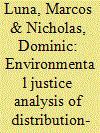

|
|
|
|
|
| Summary/Abstract |
A growing body of research shows that natural gas leaks at the distribution level are much more common and extensive than previously thought. Although scholars and advocates have raised alarms about the climate change and economic significance of these leaks, there has been little consideration of the problem from an environmental justice perspective. Using recently available high resolution leak data, this analysis of natural gas leaks across the state of Massachusetts shows that People of Color, limited English speaking households, renters, lower income residents, and adults with lower levels of education are disproportionately exposed to natural gas leaks and that their leaks take longer to repair, as compared to the general population, and particularly as compared to White residents and to homeowners. This pattern is evident for all leaks in the state, for leaks disaggregated by leak class or grade, and for leaks disaggregated by utility. This analysis shows that natural gas leaks are an environmental justice issue warranting further study and policy attention.
|
|
|
|
|
|
|
|
|
|
|
|
|
|
|
|
| 15 |
ID:
183580


|
|
|
|
|
| Summary/Abstract |
Despite Qatar's National Vision 2030 implementation, several organisations within the oil and gas sector still have difficulties in embedding sustainability agenda in their systems and processes. There is, also, a paucity of empirical research on the key challenges Qatar oil and gas organisations face in embedding sustainable strategies to improve competitiveness – which is the core raison d’être of this paper. A qualitative approach was adopted to collect and analyse data based on 24 interviewees from eight organisations. Six key challenges hindering the implementation of sustainability strategies. They are: stakeholders' issues, volatility of price, resistance to change, knowledge and awareness, initial cost and strategic issues. Furthermore, the graph theoretic and matrix approach was applied to evaluate the challenges inhibiting the implementation of sustainability strategies within the Qatar oil and gas industry. The results show that strategic issues represent a greatest challenge when compared to other challenges.
|
|
|
|
|
|
|
|
|
|
|
|
|
|
|
|
| 16 |
ID:
183568
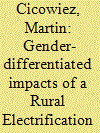

|
|
|
|
|
| Summary/Abstract |
This paper investigates the potential impacts of the Nigerian Rural Electrification Fund (REF-1) on the development of rural communities and specifically assesses the policy's differential impacts on men and women's employment and income. It examines the best approach for the implementation of the subsidy grant that promotes economic activities in the rural areas, in line with the objective of the policy. To that end, a gendered Computable General Equilibrium (CGE) model was employed and data were analyzed under four scenarios against a baseline scenario. The results indicate that as the rural electrification fund increases energy supply, market employment for women, factor incomes, and output in the agricultural sector also rises. Also, the scenario where the subsidy grant was combined with labour and factor productivity, recorded the largest increase overall. The policy implication of these results is that a policy complementary approach is needed to achieve the goals highlighted in the Nigerian Rural Electrification Strategy policy and to produce the desired economic outcomes. In other words, the government subsidy grants on its own to expand electricity supply in the rural areas is not sufficient, it will need to be complemented with policies that enhances productivity and efficiency.
|
|
|
|
|
|
|
|
|
|
|
|
|
|
|
|
| 17 |
ID:
183581


|
|
|
|
|
| Summary/Abstract |
The effective government mandatory energy-biased technological progress and its transition to price-induced or R&D-induced technological progress is critical to achieving sustainable development in developing countries such as China. Based on a quasi-natural experiment of cleaner production standards in China, this study investigated the impact of government mandatory energy-biased technological progress on enterprises' environmental performance using the difference-in-differences method. Highly robust benchmark results indicated that the implementation of cleaner production standards effectively reduced the SO2 emissions intensity of enterprises, but failed to reduce the aggregate SO2 emissions. Mechanism analysis showed that the SO2 emissions intensity reduction effect is achieved by introducing advanced production process and desulfurization equipment and thus increasing fixed investment. Nevertheless, it “squeezes out” enterprises' R&D expenditures and increases the amount of coal consumption. Moreover, it can improve the degree of resource misallocation through affecting the entry and exit decisions of companies with heterogeneous productivity. Heterogeneity analysis revealed that the implementation of cleaner production standards is affected by enterprise ownership, industry characteristics, etc. This study suggests that the government should develop a market-oriented energy price regime, optimize the energy factor market, and improve the dual control system of energy consumption intensity and aggregate energy consumption.
|
|
|
|
|
|
|
|
|
|
|
|
|
|
|
|
| 18 |
ID:
183570


|
|
|
|
|
| Summary/Abstract |
Energy transition is a fundamental part of the policy response to climate change, but unlike climate change, we know little about the factors that shape public attitudes about it. We address three questions: 1) how supportive are people of energy transition, 2) how do pre-existing ideas – about politics, economics, climate change, and energy – affect public views on energy transition, and 3) how malleable is public opinion about transition? Using the Canadian province of Alberta – a context where oil and gas are politically and economically predominant – we assess these questions with a population-based survey experiment (n = 1591). Results indicate that energy transition is widely popular. Pre-existing values and beliefs about the economy; political identification with the left-right spectrum; worry about climate change; and hope in the future of oil and gas as a predominant industry strongly structure attitudes about transition. We argue that championing the economic benefits of clean energy will not be persuasive with people who continue to have high hopes in the future economic benefits of fossil fuels. Instead, we suggest policy makers focus instead on the economic risks that come from continued reliance on fossil fuels.
|
|
|
|
|
|
|
|
|
|
|
|
|
|
|
|
| 19 |
ID:
183572


|
|
|
|
|
| Summary/Abstract |
Access to an uninterrupted electricity supply is an important driver of growth and human development. However, people in many developing countries do not yet have access to a steady electricity supply – partly due to power cuts, blackouts, and load-shedding. Such disasters exert pressure on households and hinder energy modernization. This paper investigates how households' fuel choices are possibly distorted amidst unreliable electricity supply. It studied households' cooking fuel choices and fuel switching behavior in the face of the load-shedding problem in Nepal (2006–2016). This study employs two National Living Standard Surveys (NLSSs) and four Annual Household Surveys (AHSs). Multinomial Logit and Multinomial Probit model estimations suggest that the crisis delayed households' energy modernization drive. Furthermore, households diversified their fuel basket and increased ‘energy stacking’ in response to the crisis. Despite a trend of increasing preferences towards modern fuels, significant reliance on traditional fuels remains. Therefore, it is recommended to improve supply reliability remarkably for a successful transition toward modern energy. Moreover, the nature of the crisis needs to be well understood to formulate efficient policies on energy transition since different crises might affect households differently.
|
|
|
|
|
|
|
|
|
|
|
|
|
|
|
|
| 20 |
ID:
183571


|
|
|
|
|
| Summary/Abstract |
This study aims to investigate the relationship between critical success factors and sustainable project success of renewable energy projects of Pakistan. In this study, supportive leadership intervenes between critical success factors and sustainable project success. The study adopts a quantitative research approach using survey data from the project managers, project team leaders, and project staff of renewable energy projects. A questionnaire survey approach is used to collect data. For data analysis, we used the partial least square structural equation modeling through SmartPLS 3.2.2. The outcomes indicate that in the direct relationship, organizational, communication, and technical factors positively and significantly affect the sustainable project success, while team factors show insignificant relationships with sustainable project success. Moreover, organizational, team, and communication factors positively and significantly affect supportive leadership, while technical factors have established an insignificant relationship with supportive leadership. Besides, supportive leadership also positively and significantly impacts sustainable project success. The outcomes also show that supportive leadership positively and significantly mediates between organizational, team and communication factors and sustainable project success. Meanwhile, supportive leadership negatively and insignificantly mediates between technical factors and sustainable project success. The concluding remarks also discussed the practical implications, limitations, and future research directions.
|
|
|
|
|
|
|
|
|
|
|
|
|
|
|
|
|
|
|
|
|